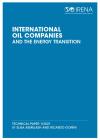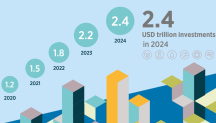

-
-
Asmelash, E. and R. Gorini (2021) International oil companies and the energy transition, International Renewable Energy Agency, Abu Dhabi
Copied
Oil companies and the energy transition
This paper analyses the strategies of seven international oil companies (IOCs) in the context of energy transition.
Newsletter
Key Facts
The International Renewable Energy Agency's (IRENA) transforming energy scenario identifies the course the world should pursue to create a sustainable future energy system. To achieve this goal, profound changes will be required to convert the present system from dependence on fossil fuels to greater reliance on renewable energy.
This staff technical paper published by the International Renewable Energy Agency (IRENA) analyses the strategies of seven international oil companies (IOCs) in the context of the energy transition – BP PLC, Chevron Corp., Eni SpA, Equinor ASA, ExxonMobil Corp., Royal Dutch Shell PLC and Total SE. It describes how these companies are adapting to the ongoing transformation and assesses the measures they have implemented against the requirements of climate stabilisation.
The challenge these companies now face is two-fold; not only will they need to adapt to survive the ongoing energy transition, but to protect their activities they should also evolve to position themselves at the forefront of a decarbonising energy system.
The paper identifies opportunities for IOCs to position themselves as energy companies of the future, leading global progress in sustainable and inclusive growth in line with the ongoing shift towards low-carbon and net-zero policies.
This staff technical paper published by the International Renewable Energy Agency (IRENA) analyses the strategies of seven international oil companies (IOCs) in the context of the energy transition – BP PLC, Chevron Corp., Eni SpA, Equinor ASA, ExxonMobil Corp., Royal Dutch Shell PLC and Total SE. It describes how these companies are adapting to the ongoing transformation and assesses the measures they have implemented against the requirements of climate stabilisation.
The challenge these companies now face is two-fold; not only will they need to adapt to survive the ongoing energy transition, but to protect their activities they should also evolve to position themselves at the forefront of a decarbonising energy system.
The paper identifies opportunities for IOCs to position themselves as energy companies of the future, leading global progress in sustainable and inclusive growth in line with the ongoing shift towards low-carbon and net-zero policies.




